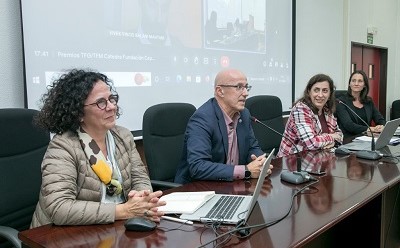- A total of 33 Bachelor's and 6 Master's theses were submitted in this third call for proposals
The first prize for the Bachelor's theses went to Jennifer Rodríguez, who presented the thesis titled 'Electrocatalysts to generate green hydrogen,' while the second prize went to Levi Emanuel Arrieche, with the 'Preliminary study of the contribution to energy self-sufficiency of anaerobic digestion processes of SANDACH waste.' There was a third award for Ernesto Cruz for 'Study of the hybridization of combined cycles with compressed air energy storage systems. Application in the Canary Islands'.
For the Master's theses, the first prize went to Fouad José Salazar for 'Development and Evaluation of Open-Source prEN50549-10 Tests Scripts for Improved Solar Integration.' Second prize went to Daniel Fariña with 'Preliminary Design of a Geothermal Plant located in Tenerife,' and the third prize went to Vivek Balani with 'Benefits of Grid Forming Inverters in Isolated Electrical Power Systems: The case of Tenerife'.
The event, which took place in the Chemistry Department of the Faculty of Sciences of the University of La Laguna, was attended by the vice-rector of Culture and Social Participation of the ULL, Juan Albino Méndez; the director of the Chair, Elena Pastor; the head of Fundación Cepsa in the Canary Islands, Belén Machado; and the director of the Cepsa Research Center, Joana Frontela. The latter, who was also a member of the technical committee that decided on the awards, highlighted the quality of the projects presented, of the total of 33 Bachelor's and 6 Master's theses.
Belén Machado noted that these awards were launched in the 2019/20 academic year, one year after the creation of the Chair, and stressed that they value acquiring skills, "as well as the initial contact with research." She added that, given the quality of the works presented, the award winners face a promising professional future and stressed that the works follow the line defended by the Chair, focused on aiming for the progress of society.
For her part, Elena Pastor congratulated the award winners and thanked the members of the selection committee for their work. Juan Albino Méndez indicated that this is a priority line of the vice-rectorate to further link research and projects created at the university with the productive fabric of the Canary Islands.
Selected topics
The first Bachelor's thesis award focused its work on promoting sustainable and environmentally-friendly energy conversion and storage systems to address the impact of fossil fuel use on the global economy and the environment. The work centers on an ideal energy cycle in which electrical energy can be converted into fuel or value-added chemicals by electrochemical water splitting, CO2 reduction and reconversion into electrical energy through fuel cells.
The second thesis studied the contribution of anaerobic digestion of this type of waste generated in Tenerife to its energy self-sufficiency through renewable energy sources. The study states that these by-products are highly polluting and are usually buried in landfills, generating environmental problems. Using SANDACH to generate biogas through anaerobic digestion is proposed.
The third prize is a hybridization with the combined cycle number 2 of the Granadilla thermal power plant. This storage system is intended to take advantage of both Tenerife's renewable energy discharges and one of the newest power generation groups in the archipelago and to increase the net power produced by the combined cycle.
As for the Master's theses, the first prize focused on automating certification procedures for the grid support functions of PV inverters. The aim is to meet the high demand in this area and address the rapid deployment and integration of smart grid technologies.
The second notes that Tenerife is one of the islands with the greatest geothermal potential and advocates for building a plant there. It added that geothermal power generation would have little environmental impact. It would also promote energy independence, adding that the island would benefit from fully manageable energy that does not need storage and is constant, clean, and low cost.
The third award presented the performance a Grid Forming Inverter (GFM) prototype in a microgrid to study the response to frequency events and system splitting tests. GFMs are small isolated systems, which are essential to achieving an electrical system based entirely on renewable energy, and at the same time they are an ideal testing ground to start developing these new energy sources.

